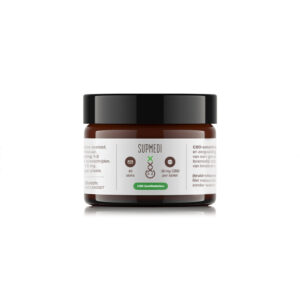
Type 1 vs Type 2 Diabetes: How Can CBD Help?
18 July 2024Can you use CBD for type 1 and type 2 diabetes, and how might CBD help? Diabetes is a common metabolic disease usually treated with conventional medications and insulin. However, CBD oil may also have a positive impact on these conditions. In this blog, we discuss what research shows.
What are the different types of diabetes?
Diabetes is a metabolic disease, but there are two different types. Both lead to an increase in blood sugar levels, thereby increasing the risk of damage to the heart and blood vessels. These are the similarities, but they differ in how they develop.
Type 1 diabetes is an autoimmune disease. The cause lies in the fact that the body’s own immune system attacks the cells in the pancreas that produce insulin. As a result, the body can no longer produce insulin. This form of diabetes often develops in childhood and is treated by administering insulin.
Type 2 diabetes is the most common form. It usually develops in adults. The body becomes less sensitive to insulin (this is called insulin resistance), causing too much glucose to remain in the blood. Insulin is still produced in type 2 diabetes. This form of diabetes is often associated with overweight and high blood pressure. Treatment consists of medication and lifestyle advice.
Now that we understand the different types of diabetes, the question is what CBD can do for these conditions. CBD is a cannabinoid found in the hemp plant. Unlike THC, it does not have psychoactive properties. However, CBD can have anti-inflammatory and pain-relieving effects. It may also influence blood sugar levels.

Research on type 1 and type 2 diabetes and CBD
Diabetes is one of the many conditions that involve inflammation. Additionally, we know that the endocannabinoid system (ECS) plays an important role in regulating metabolism. Unfortunately, there are not many studies on the impact of CBD on diabetes. However, what we do know is promising.
Preliminary studies suggest that the endocannabinoid system determines the sensitivity of the insulin response of adipocytes (fat cells). This means that the ECS plays a crucial role in how the body responds to insulin. It can therefore increase or decrease insulin sensitivity. This is significant for people taking insulin, as it can cause sudden changes in blood sugar levels, making the condition more challenging to manage.
The potential benefits of CBD for the two types of diabetes
Practically speaking, what are the benefits of CBD for diabetes? In type 1 diabetes, there is a lack of insulin because the insulin-producing cells in the pancreas are destroyed. A 2020 study on rats showed that CBD could lead to weight gain and an increase in insulin levels, helping lower blood sugar levels. However, most studies have been conducted on animals, and it is unclear if CBD has the same effect on diabetes in humans.
For both type 1 and type 2 diabetes, CBD is often used to relieve pain, especially nerve pain (neuropathy). Many people use CBD salve or CBD oil, which can be applied to painful areas. CBD tablets are also a good option, as they can help reduce inflammation from within. CBD can also be used for osteoarthritis, a condition often associated with diabetes.
The anti-inflammatory and pain-relieving properties of CBD help alleviate symptoms. CBD can be used alongside regular anti-inflammatory medications. A 2019 study found that a 30-day treatment with CBD improved memory and reduced nerve inflammation in rats with poor blood flow to the brain and diabetes.
A 2020 review highlighted the benefits of CBD for different types of diabetes. This study, conducted on animals, used full-spectrum CBD to treat neuropathic pain and inflammation. Full-spectrum CBD contains not only CBD but also other cannabinoids and terpenes, which have pain-relieving and anti-inflammatory effects.
Additionally, a 2021 review found that CBD could protect retinas from inflammation associated with diabetes. It reduces blood vessel permeability and helps protect against neurotoxicity. CBD can also protect metabolism from diabetes-induced damage and cerebral ischemia (neurological impairment).

Conclusion: CBD and diabetes
What can CBD do for different types of diabetes? Unfortunately, there is not much research on humans. It seems that CBD does not directly affect blood sugar levels but can help relieve other symptoms often associated with the condition, such as pain, inflammation, and resulting sleep problems.
There is also research suggesting that CBD can help reduce the risk of developing diabetes. Additionally, CBD might encourage the body to convert white fat, which is unhealthy, into brown fat, potentially increasing the body’s ability to use glucose.

CBD Tablets1200 mg CBD
€24.95







